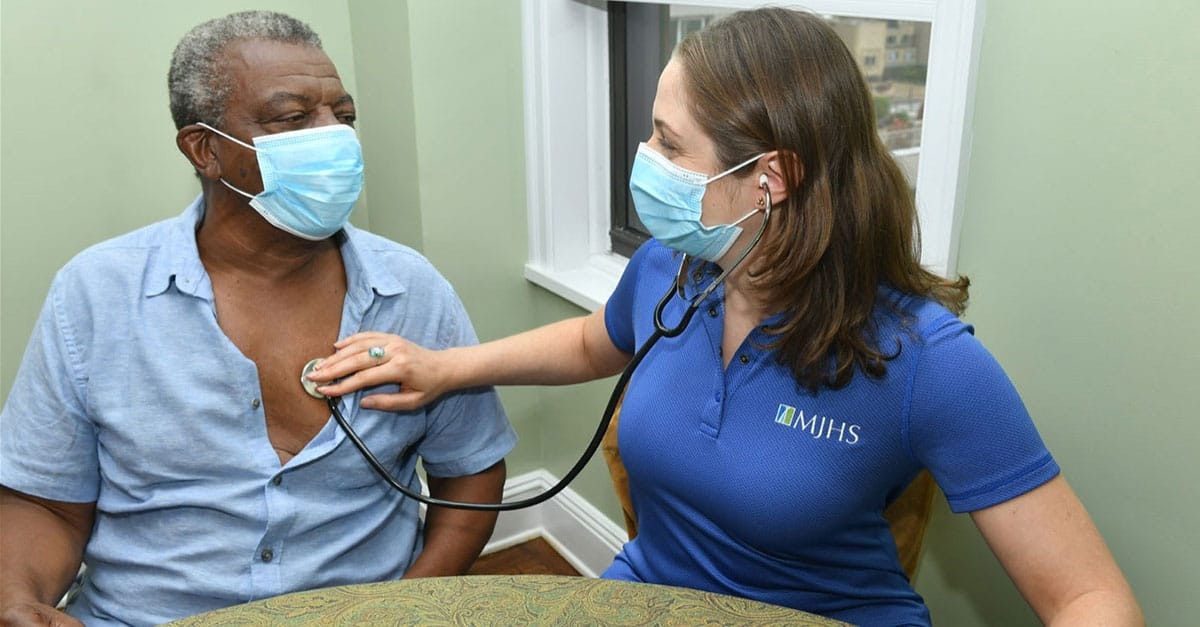
Congestive Heart Failure (CHF) and You
Congestive Heart Failure (CHF), also known as Heart Failure, is when your heart gets damaged and is not pumping enough blood to meet your body’s needs. It is the leading cause of hospitalizations for people 65 and over and can often result in:
- Extra fluid build-up in the body, leading to swelling in your lungs, abdomen, ankles, and/or feet
- Feeling short of breath, tired, or weak
- Experiencing difficulty breathing when lying flat in bed
- Rapid weight gain from fluid build-up
The cause of heart failure may vary. To find out what kind of heart failure you have, your doctor may order an echocardiogram to see how well your heart pumps blood. This percentage is called an ejection fraction. An ejection fraction below 45% shows some loss in the strength of your heart.
There are four types of heart failure:
Left-sided Heart Failure
When the left side of the heart is not working correctly, fluid backs up into the lungs. When this happens, you may feel short of breath, have a cough, have difficulty lying flat, and feel more comfortable propped up on pillows. You may wake up during the night feeling out of breath. In addition, your kidneys may produce less urine because not as much blood is being pumped through them. This causes your body to retain fluids, and you will gain weight and feel swollen.
Right-sided Heart Failure
When the right side of the heart is not working properly, blood backs up in your veins. Often this is noticeable in your neck. You may note that your feet, ankles, or legs become swollen, or you may urinate more frequently at night, feel tired, and have tenderness in the upper right part of your abdomen.
Systolic Failure
You have systolic heart failure when your heart cannot contract with the necessary force to push enough blood to the rest of the body. This is usually the result of a heart attack, which leaves the heart muscle damaged. Your ejection fraction is generally less than 40%.
Diastolic Failure
When your heart has a problem relaxing, diastolic heart failure occurs. Your heart cannot properly fill with blood because the heart muscle has become thick and stiff. Your ejection fraction may be normal, but the heart cannot re-fill between beats. This is usually caused by high blood pressure.
What is the treatment for Heart Failure?
The main treatment for heart failure is medication. Medications can help relieve the symptoms, keep you out of the hospital and help you live a normal life. It is essential to take your medications regularly, at the correct time, and in the right amount.
What do I do if I have symptoms of Heart Failure?
The most important thing is to get your symptoms under control. As the first certified home health agency in the US to receive Joint Commission Certification for Heart failure Disease Management, we are uniquely positioned to help you or your loved one manage symptoms associated with CHF.
We have also developed a special home-based program in cooperation with the American Health (AHA) and the National Partnership for Healthcare and Hospice Innovation (NPHI) to support patients suffering from cardiac disease at every stage of their illness.
Please contact MJHS if you are interested in learning more about our Congestive Heart Failure Advantage Program. You can also read our Patient and Caregiver Handbook.
MJHS Advantage for Congestive Heart Failure
What you know can make a big difference. That’s why at MJHS, we believe in giving you the support and tools you need to make informed decisions to help you live your healthiest, most energetic life. That commitment earned us Joint Commission certification for heart failure disease management—the first such honor for any home health care agency in the nation.
If you or your loved one is suffering from Congestive Heart Failure (CHF)—you may benefit from our Congestive Heart Failure Program. The program was developed with cooperation from the American Health (AHA) and the National Partnership for Healthcare and Hospice Innovation (NPHI) to support patients suffering from cardiac disease at every stage of their illness.
If you or your loved one is being discharged home from the hospital, you may be eligible to receive home care visits from a nurse to:
- Reduce the stress of transitioning home from your hospital stay
- Promote medication adherence; facilitate adjustments and education
- Provide tools to help you manage your symptoms, such as the Patient and Caregiver Handbook, specifically created for people living with advanced cardiac disease
If you or your loved ones have advanced CHF, you may receive support from a palliative care specialist for three months or longer to:
- Improve symptom management
- Encourage goals discussion about advanced care planning
- Provide family support
- Offer hospice eligibility review
If you or your loved one is eligible for hospice care, they may receive the following:
- Assistance transitioning home after a hospital stay
- Comprehensive home-based services for end-of-life-care
- Expert symptom management and family support
To learn more about the MJHS Advantage for Congestive Heart Failure, please contact MJHS. You can also read our Patient and Caregiver Handbook.
At MJHS, we value both personal and professional caregivers and recognize the critical work you do. That is why we have created these online caregiving resources to help you through this crucial time in your life.
If you need additional help and support caring for your loved one, please feel free to contact MJHS. We can recommend other care options available to you through one of our programs.